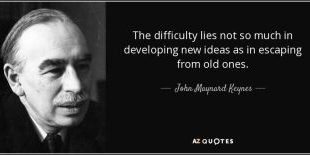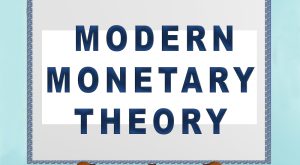MMT = Keynes 2.0 As time goes on, and 2020 turns into 2021, the long-held idea that governments are like households and businesses that have to repay their debts, or even that government deficits must be financed by debt at all, will increasingly be exposed as a mistake. It will be more or less a return to Keynes, except with the twist that the Keynesian aim of balancing the budget over the course of the cycle – deficits in bad times, surpluses in good...
Read More »Türkei — eine Handtasche voller Pressefreiheit
Türkei — eine Handtasche voller Pressefreiheit [embedded content]
Read More »Les passants
[embedded content]
Read More »Some MMT basics
[embedded content]
Read More »Does MMT — really — ignore expectations?
Does MMT — really — ignore expectations? A view yours truly often encounters when debating MMT is that there is an inflationary bias in MMT and that its framework ignores expectations. Hmm … It is extremely difficult to recognize that description. Given its roots in the writings of Keynes, Lerner, and Minsky, it is, to say the least, rather amazing to attribute those views to MMT. Let me just quote one source to show how ill-founded the critique is on this...
Read More »Sir Tom Moore
[embedded content] War veteran Tom Moore won the hearts of people by raising more than £50 million for the NHS by walking laps of his garden. Thanks, Sir Tom! [embedded content]
Read More »Pandemic depression antidote (XXI)
Pandemic depression antidote (XXI) [embedded content] Never give in. Never give up.
Read More »Keynesian vs Newtonian economics
Keynesian vs Newtonian economics To complete his theory, Keynes tied these elements together. The market for money determined interest. Interest (and the state of business confidence) determined investment. Investment, alongside consumption, determined effective demand for output. Demand for output determined output and employment. Consumption out of incomes determined savings. Employment determined the real wage. In this world, a change in monetary policy,...
Read More »Rethinking public debt
[embedded content] Public debt is normally nothing to fear, especially if it is financed within the country itself (but even foreign loans can be beneficent for the economy if invested in the right way). Some members of society hold bonds and earn interest on them, while others pay taxes that ultimately pay the interest on the debt. The debt is not a net burden for society as a whole since the debt ‘cancels’ itself out between the two groups. If the state issues bonds at a...
Read More »The Deficit Myth: a review
The Deficit Myth: a review One common objection to neoclassical economics is that it underweights the importance of history and class. It is therefore paradoxical that Stephanie Kelton’s The Deficit Myth, which claims to challenge orthodox economics, should be guilty of just these vices. Let’s start by saying that I wholly agree with the main claims she makes — that a government which enjoys monetary sovereignty can always finance its borrowing. Asking how...
Read More » Lars P. Syll
Lars P. Syll





